Computing & IS
Close to 700 Graduate from CoCIS at the Mak 75th Graduation
Published
1 year agoon
By
Jane Anyango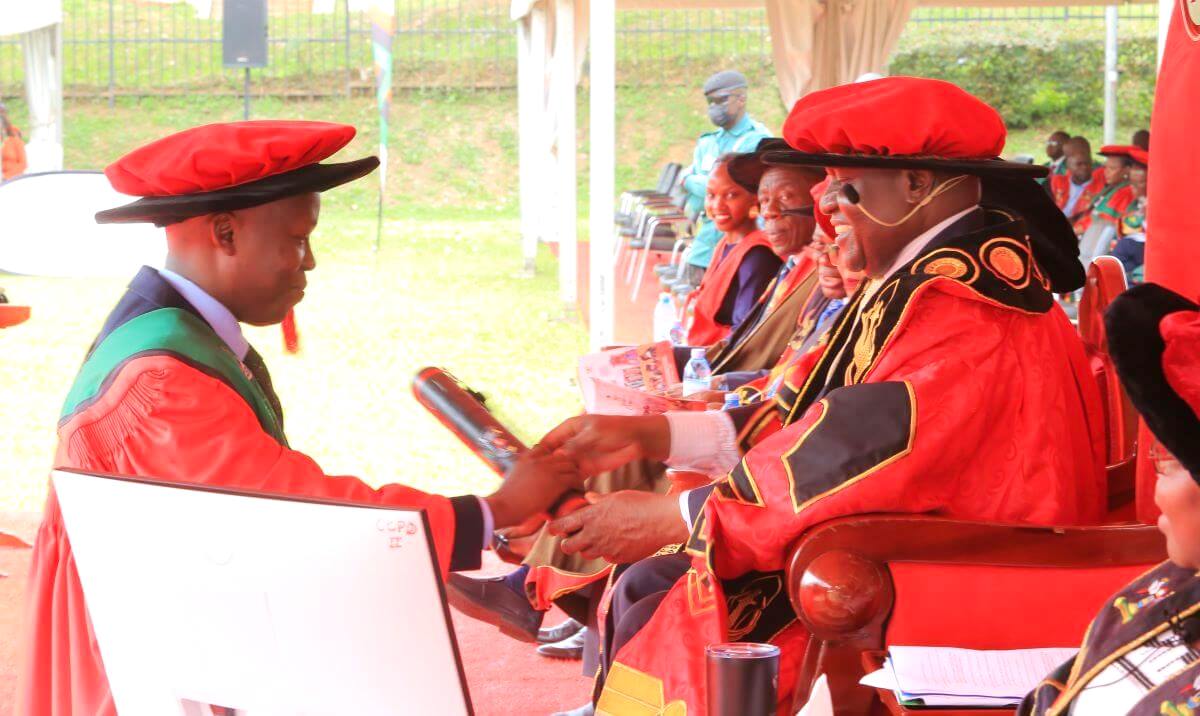
Makerere University has been directed to integrate the teaching of political economy across all courses to enhance students’ understanding of the country’s socioeconomic conditions. The directive, welcomed by the university’s top management, will be incorporated into the curriculum to align education with the needs of the people and the nation.
The government has also pledged to bolster Makerere’s research funding and strengthen partnerships with the private sector to commercialize innovations developed at the institution.
The call was made by Makerere University’s new Chancellor, Dr. Crispus Kiyonga, during the first session of the 75th graduation ceremony held on January 13, 2025, at the university’s Freedom Square. Dr. Kiyonga also urged the government and the university to establish an agro-industrial park on its land.
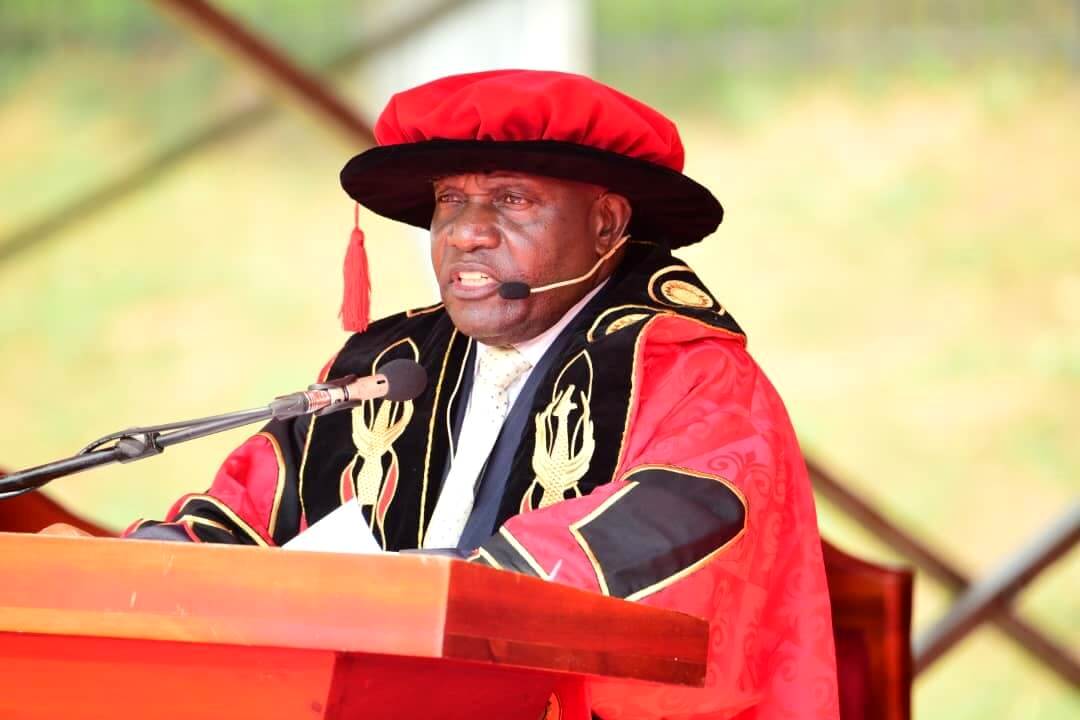
“This park would serve three purposes: teaching, generating income, and acting as a demonstration site for communities across the country,” Dr. Kiyonga noted.
The Chancellor emphasized the urgency of addressing Uganda’s food insecurity, highlighting that 40% of children in the Rwenzori region are stunted, with malnutrition affecting all regions of the country.
“Uganda must develop a robust food security system to ensure we do not starve amidst abundance,” he said.
Dr. Kiyonga also pointed out Africa’s underperformance despite its vast resources, describing it as a contradiction. “It is our responsibility to change the conditions of our people and ensure Africa rises to its potential,” he urged.
The ceremony was graced by Hon. Joyce Moriku Kaducu, Minister of State for Primary Education, who represented the First Lady and Minister of Education and Sports, Hon. Janet Kataaha Museveni. Other dignitaries included members of Parliament, the judiciary, the diplomatic corps, and academics.
Education Minister Praises Makerere for Excellence
Hon. Joyce Moriku Kaducu lauded Makerere University for its dedication to academic excellence and innovation.
“Today reflects the resilience, hard work, and commitment of our graduates, supported by the university staff, management, and parents,” she said.
The Minister commended the Vice Chancellor and management for fostering research and innovation while urging them to maintain robust quality control systems to uphold the institution’s integrity.

She also reflected on Makerere’s recent milestones, including the commissioning of a new School of Law building and the launch of the School of Graduate Studies and Research.
“Your achievements stem from hard work, transparency, and accountability. They set Makerere apart as a leader in higher education,” she noted.
Addressing the graduates, Hon. Kaducu encouraged them to apply their skills to solve societal challenges.
“Makerere has equipped you with critical thinking and creativity. Use this to seize opportunities, make a difference, and shine wherever you go,” she concluded.
Vice Chancellor Highlights Makerere’s Impact
Vice Chancellor Prof. Barnabas Nawangwe congratulated the 13,658 graduates, including 143 PhD recipients and 53% female graduates. He commended the efforts of staff, parents, and sponsors in supporting the students’ journeys.
The College of Computing and Information Sciences presented a total of 681 Graduands. Of theses12 were Doctoral candidates (7 Females and 5 males), 73 Masters candidates( 26 Female and 47 Male) and 596 Bachelors (251 Females and 345 Males)
Prof. Nawangwe praised the achievements of Makerere’s colleges, including the College of the College of Computing and Information Sciences. The College celebrated notable achievements, including three students who received the Africa 2024 Marketplace Simulation Award during the AFRICA2024 Conference in Egypt.
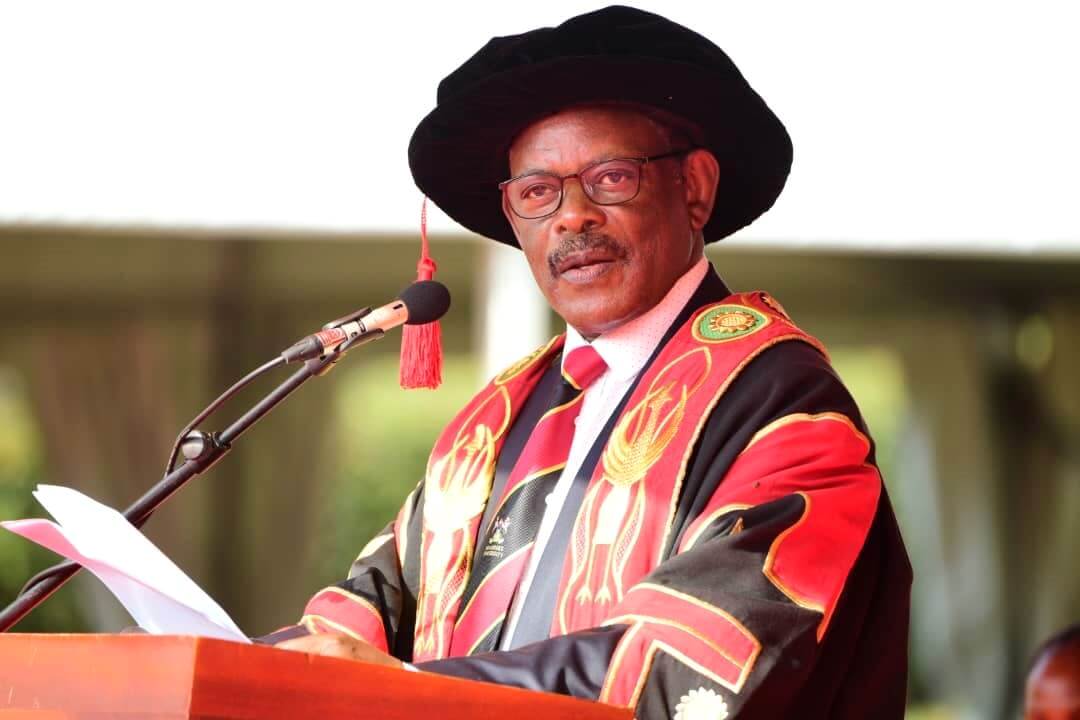
The college also secured a $1.5 million grant from Google for the Ocular project, which leverages artificial intelligence to improve the diagnosis of malaria, tuberculosis, and cervical cancer. The AI Health Lab, led by Dr. Rose Nakasi, continues to produce innovative diagnostic tools, including a phone-to-microscope adaptor, supported by partners like Google and the National Institutes of Health. Additionally, the AirQo Project launched the CLEAN-Air Africa Network, focusing on air quality management using low-cost sensors.
Prof. Nawangwe reiterated Makerere’s transformation into a research-led institution supported by the government’s Research and Innovation Fund. “We are addressing national priorities, such as improving the Parish Development Model and advancing e-governance,” he stated.
The Vice Chancellor congratulated Dr. Chrispus Kiyonga on his appointment as Chancellor and urged graduates to leverage their education to create solutions for societal challenges.
“Let your Makerere education be a beacon of hope for the world,” he concluded.
Prof. LenkaBula’s Call for Resilience and Redefining African Women’s Mission
In a keynote address by Professor Puleng LenkaBula, Principal and Vice-Chancellor of the University of South Africa (UNISA) titled “The Power of Resilience – African Woman, Find Your Generational Mission and Redefine Your Worth”, Prof. LenkaBula highlighted the critical role of African women in shaping the continent’s destiny.
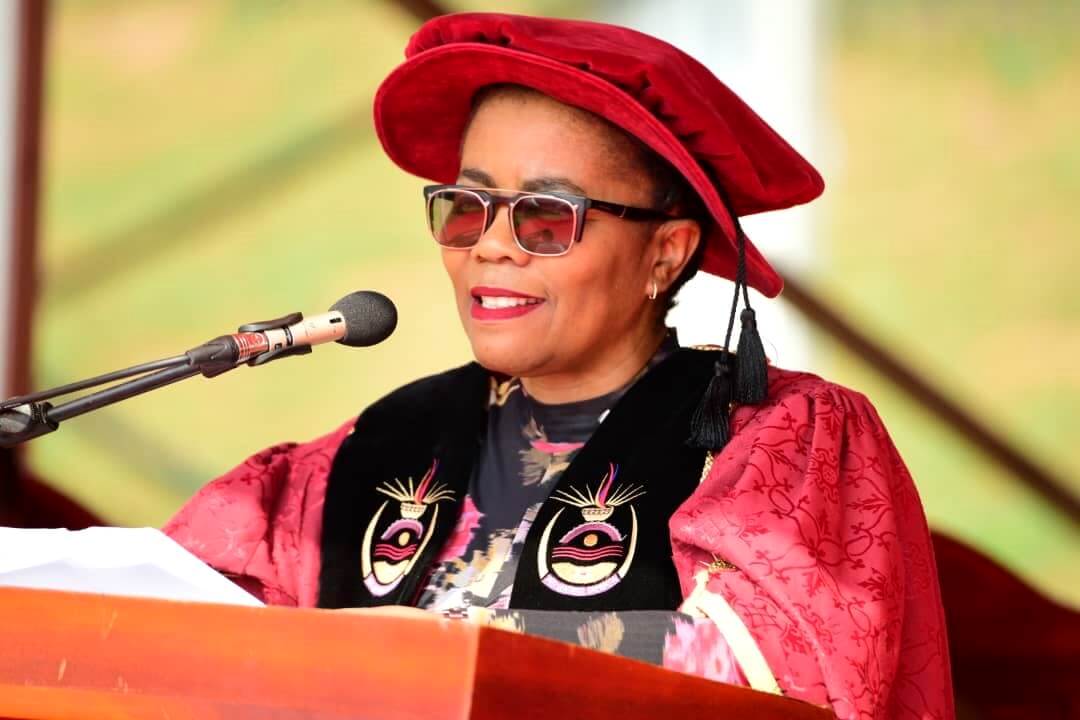
Prof. LenkaBula expressed gratitude for being invited to such a significant occasion and extended greetings from South Africa, including from UNISA’s Chancellor, former South African President Dr. Thabo Mbeki. She praised Makerere University for its legacy of academic excellence and contributions to the African continent, emphasizing its role in anti-colonial struggles, post-colonial development, and its steadfast commitment to African unity.
“Makerere University stands as a beacon of academic excellence and innovation, a vital part of Africa’s intellectual and developmental heritage,” she remarked, reflecting on the institution’s shared history with UNISA and other centers of higher learning in Africa.
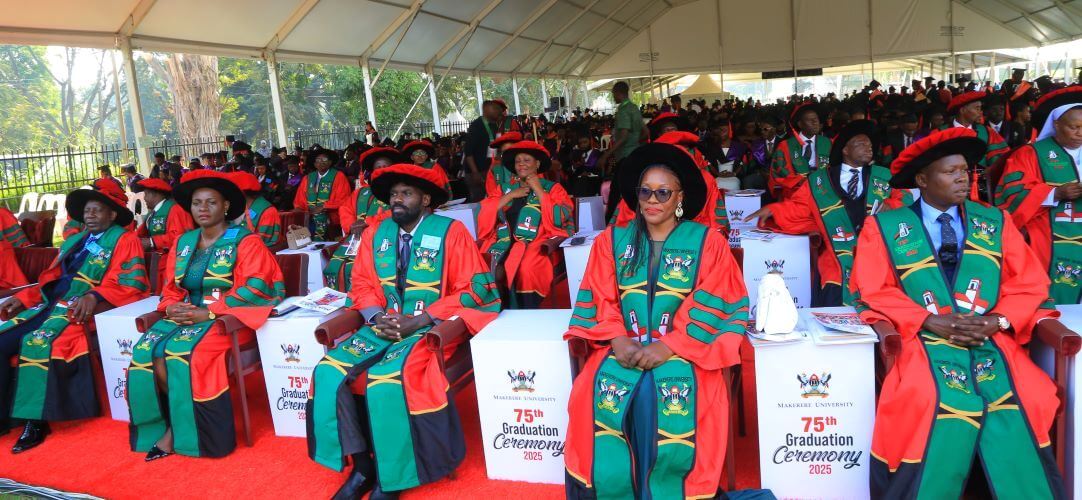
The Vice-Chancellor acknowledged the many prominent figures associated with Makerere, including freedom fighters and leading intellectuals. She also paid tribute to African women who have played pivotal roles throughout history, including Queen Amina of Zazzau, Njinga of Angola, Empress Tayetu Betul of Ethiopia, and modern figures such as Wangari Maathai and Ellen Johnson Sirleaf.
“These women embodied resilience and vision, redefining leadership in ways that transformed societies,” Prof. LenkaBula said. “It is now up to you, graduates, especially women, to take up the mantle, redefine your worth, and reclaim your generational mission.”
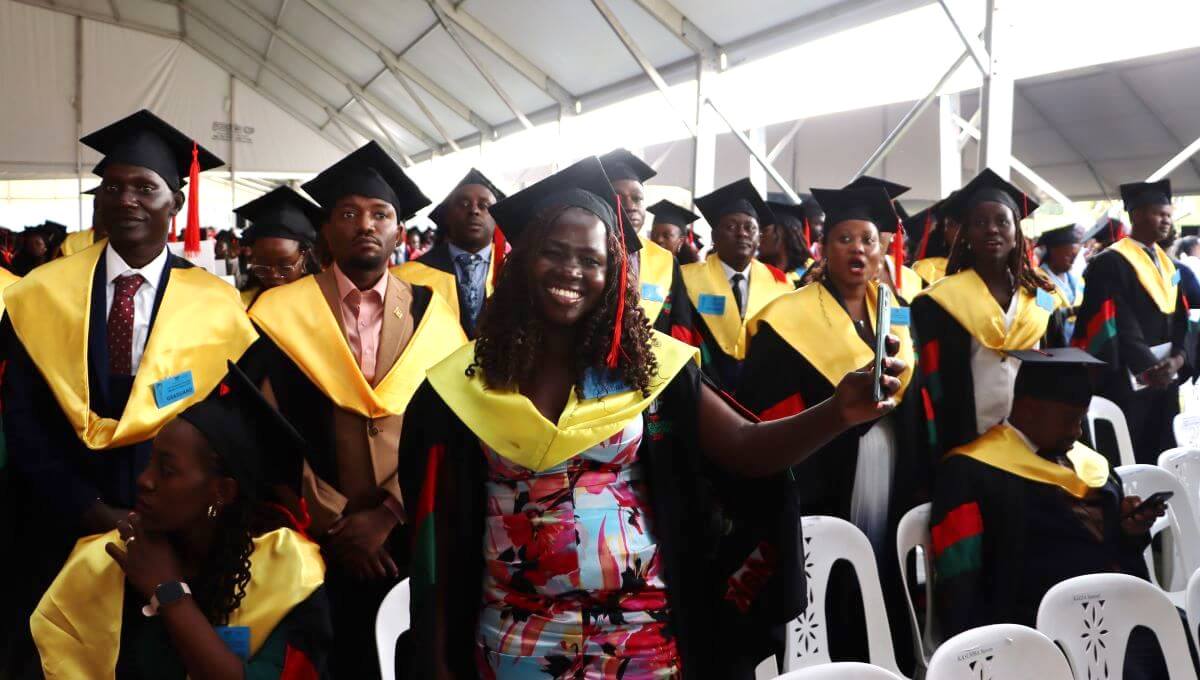
Drawing on the wisdom of influential thinkers like Frantz Fanon and Chinua Achebe, she urged graduates to embrace their responsibility as leaders and problem-solvers in Africa’s quest for prosperity. Prof. LenkaBula warned against complacency, emphasizing that each generation must confront its unique challenges and opportunities to secure a brighter future for the continent.
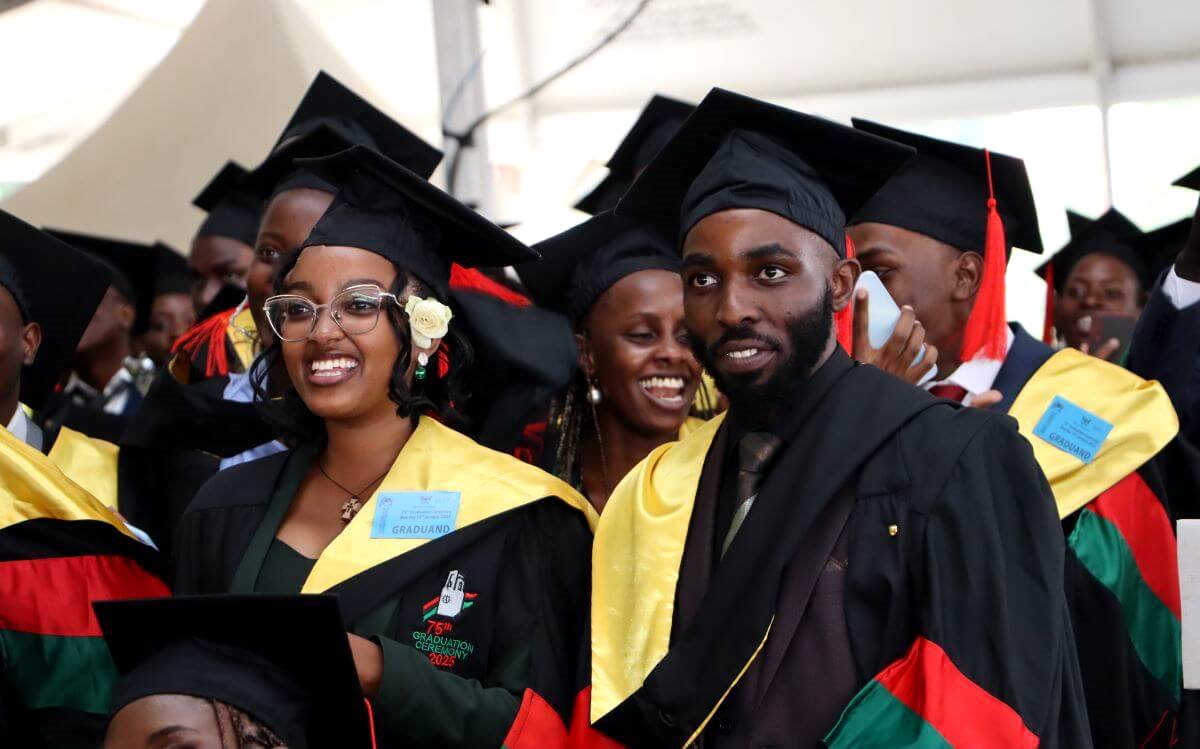
She also called for a renewed focus on gender equity in academia and leadership, noting the disproportionate burdens faced by women in society. Citing the achievements of Makerere University in gender mainstreaming, she expressed optimism about the role of young leaders in dismantling patriarchal systems and fostering inclusive development.
“As you step into the world, remain grounded in your communities while adopting a global outlook. Africa’s intellectual and social resilience has always been its greatest asset,” Prof. LenkaBula urged.
Prof. LenkaBula concluded her address to Graduands with a powerful call to action: “Your graduation is not merely a personal achievement but a contribution to Africa’s collective progress. History has thrust upon you the task of creating a future defined by resilience, innovation, and equality.”
Graduation Statistics of the 75th graduation ceremony
During the course of the 75th graduation ceremony, a total of 13,658 graduands will receive degrees and diplomas of Makerere University. Of these, a total of 143 graduands will graduate with PhDs, 1,813 with Masters degrees, 11,454 with Bachelor’s degrees and 243 with postgraduate diplomas. 53 % of the graduands are female and 47% are male. 44% of the PhD graduands are female. A total of 491 graduands will receive first class degrees. The best graduand from the sciences, graduating with a CGPA of 4.91 and a Bachelor of Science is Mr. Mubiru Enock Joel. The best graduand from the humanities, graduating with a Bachelor of Leisure and Hospitality Management, with a CGPA of 4.07 is Mr. Bagoole Abdul Latif Umar. 16% of the graduands are graduating with post-graduate degrees and diplomas.
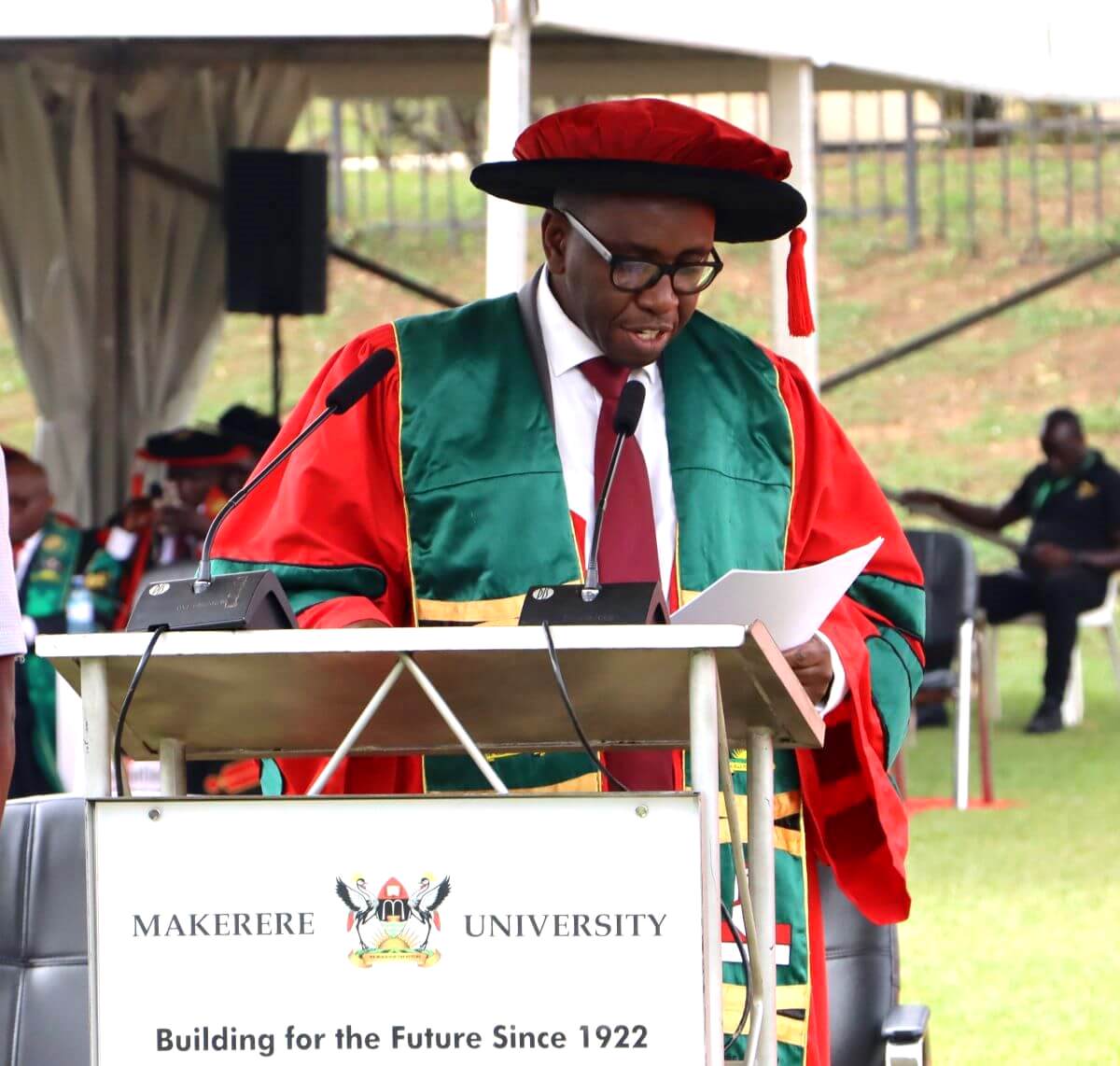
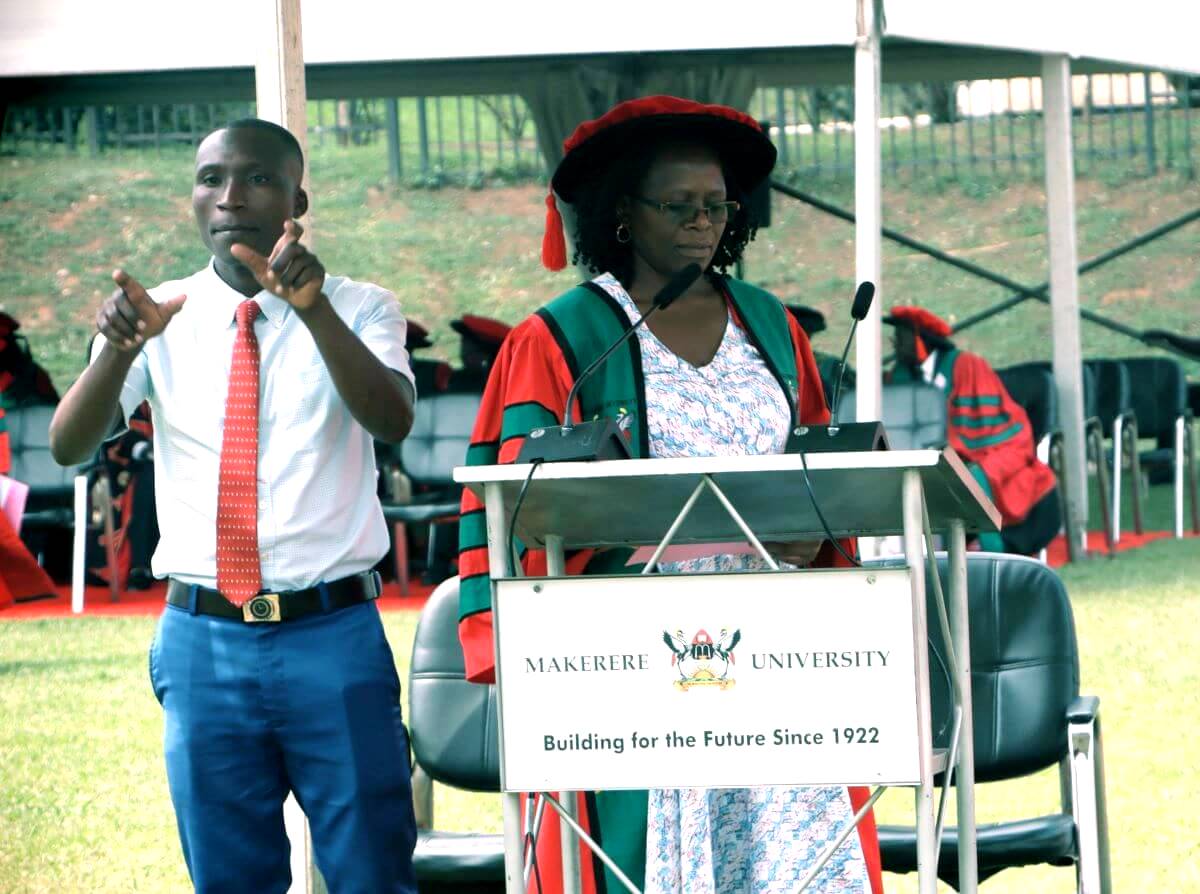
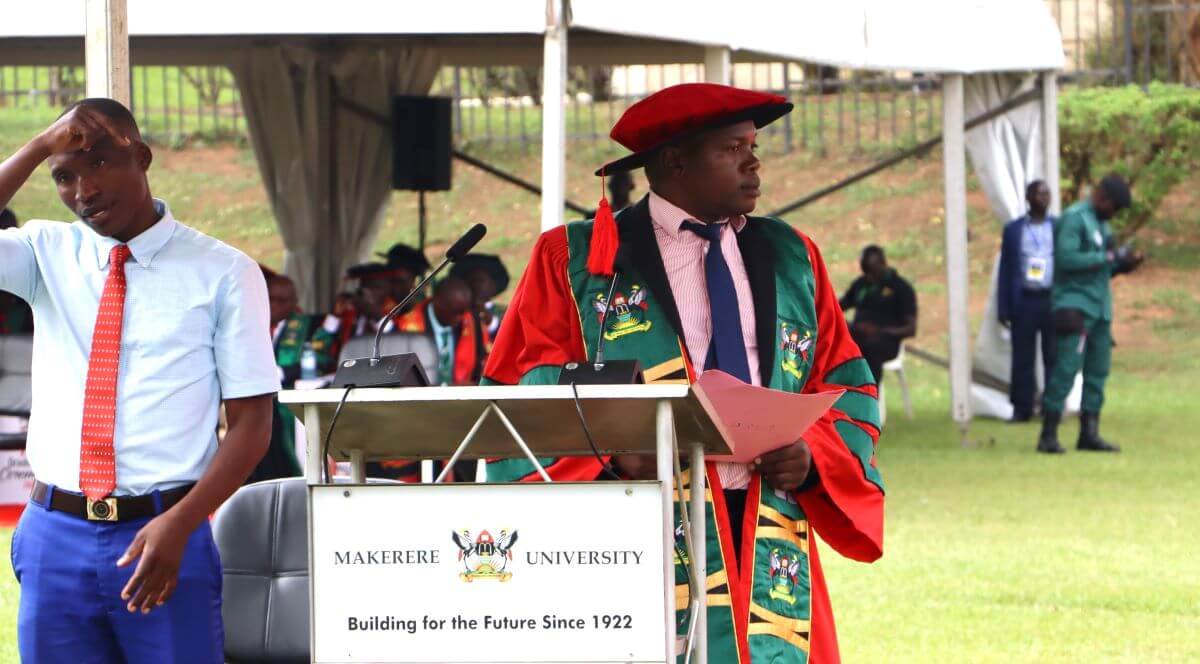
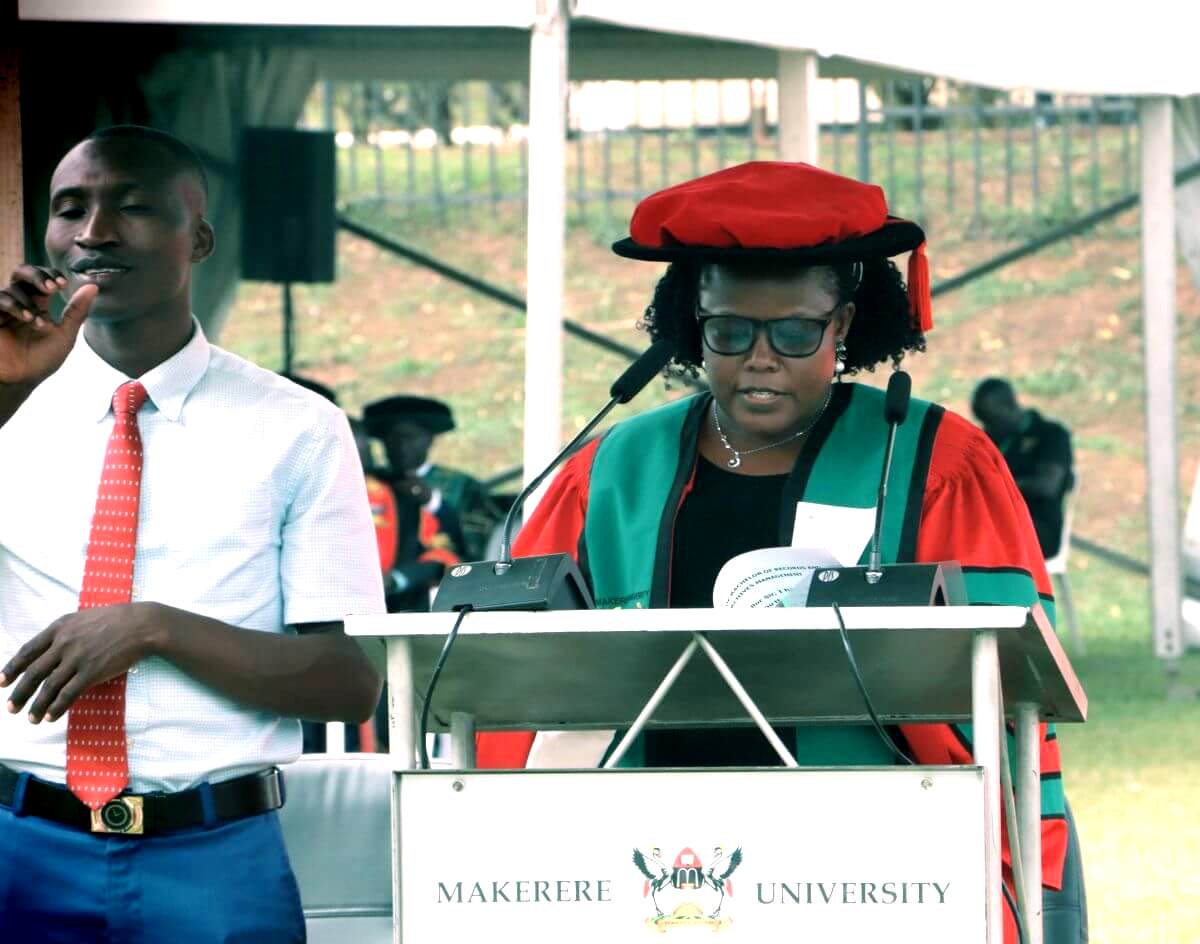
You may like
-


Mak 76th Graduation Ceremony: CoNAS Presents 16 PhDs & Best Performing Male Student in the Sciences
-


Medical graduates urged to uphold Ethical values
-


CAES Presents Overall Best Performing Student in the Sciences & a Record 28 PhDs at the 76th Graduation Ceremony
-


Graduation marks the next phase of accountability, graduates told
-


Over 9,200 to graduate at Makerere University’s 76th Graduation
-
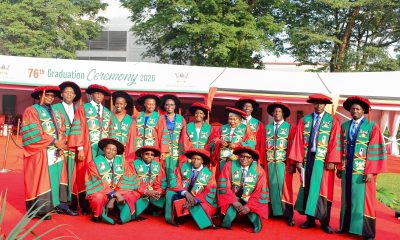

Mak 76th Graduation Ceremony: CEES Celebrates Academic Excellence, with 27 PhDs
Computing & IS
Makerere Launches Scholarly Guide, Calls for Increased Research, Publication and Innovation in Africa
Published
2 weeks agoon
February 12, 2026By
Jane Anyango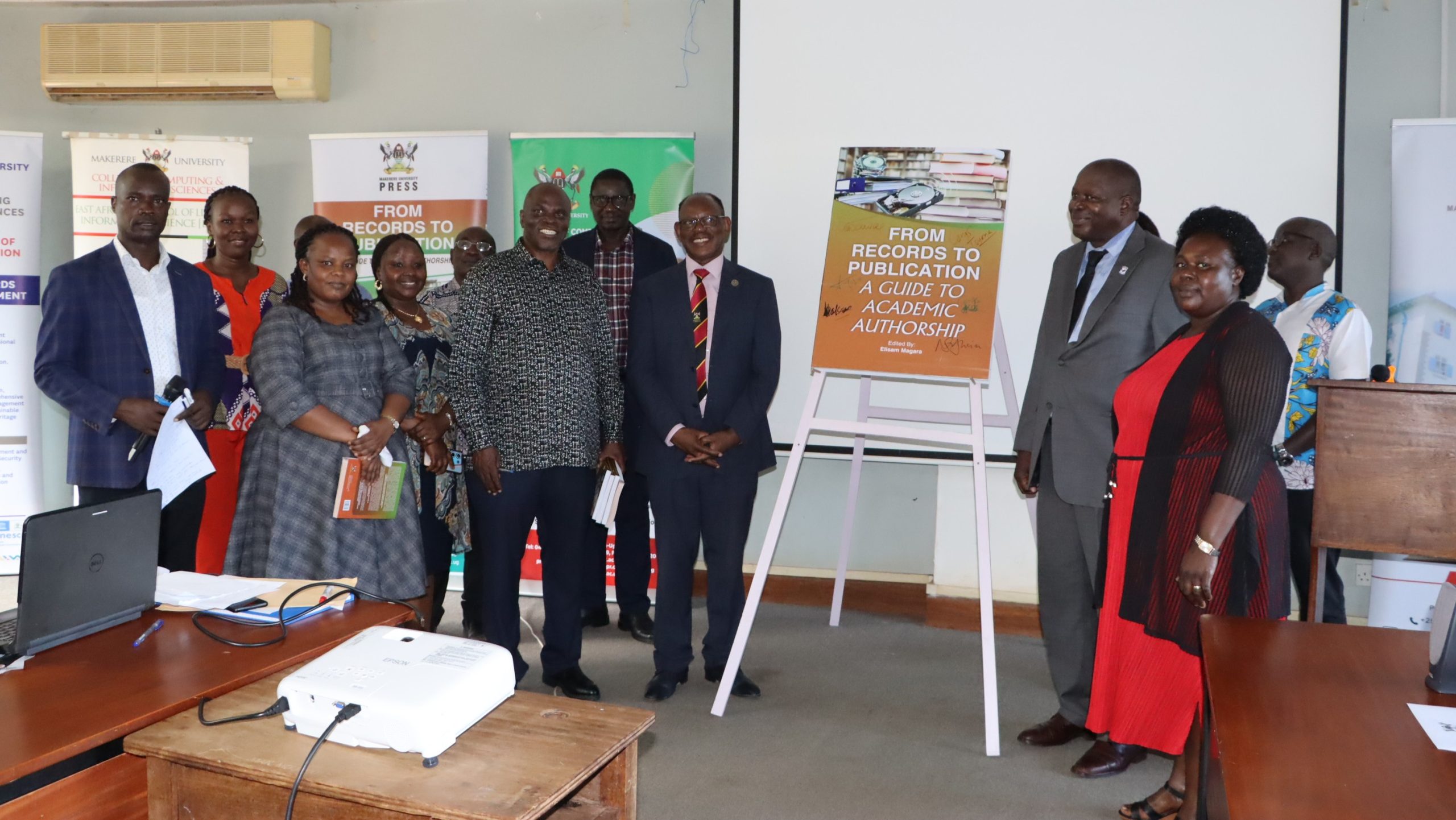
VC Emphasizes Research as Key to Africa’s Global Integration
Makerere University Vice Chancellor, Prof. Barnabas Nawangwe, has urged universities across Africa to invest in research, publication, and innovation as a pathway to greater participation in the global knowledge economy.
Speaking at the launch of From Records to Publication: A Guide to Academic Authorship, edited by Prof. Elisam Magara of the East African School of Library and Information Sciences, Prof. Nawangwe highlighted Africa’s low contribution to global scholarship. “Although Africa accounts for 15 percent of the world’s population, it produces only 3 percent of global research publications,” he said.
“There are historical reasons for this,” the Vice Chancellor continued, referencing centuries of slavery and colonialism. “You cannot brush away 600 years of subjugation. And we Africans have not even written enough about that. If we want to move Africa back into the global community, we must invest in research, publication, and innovation.”
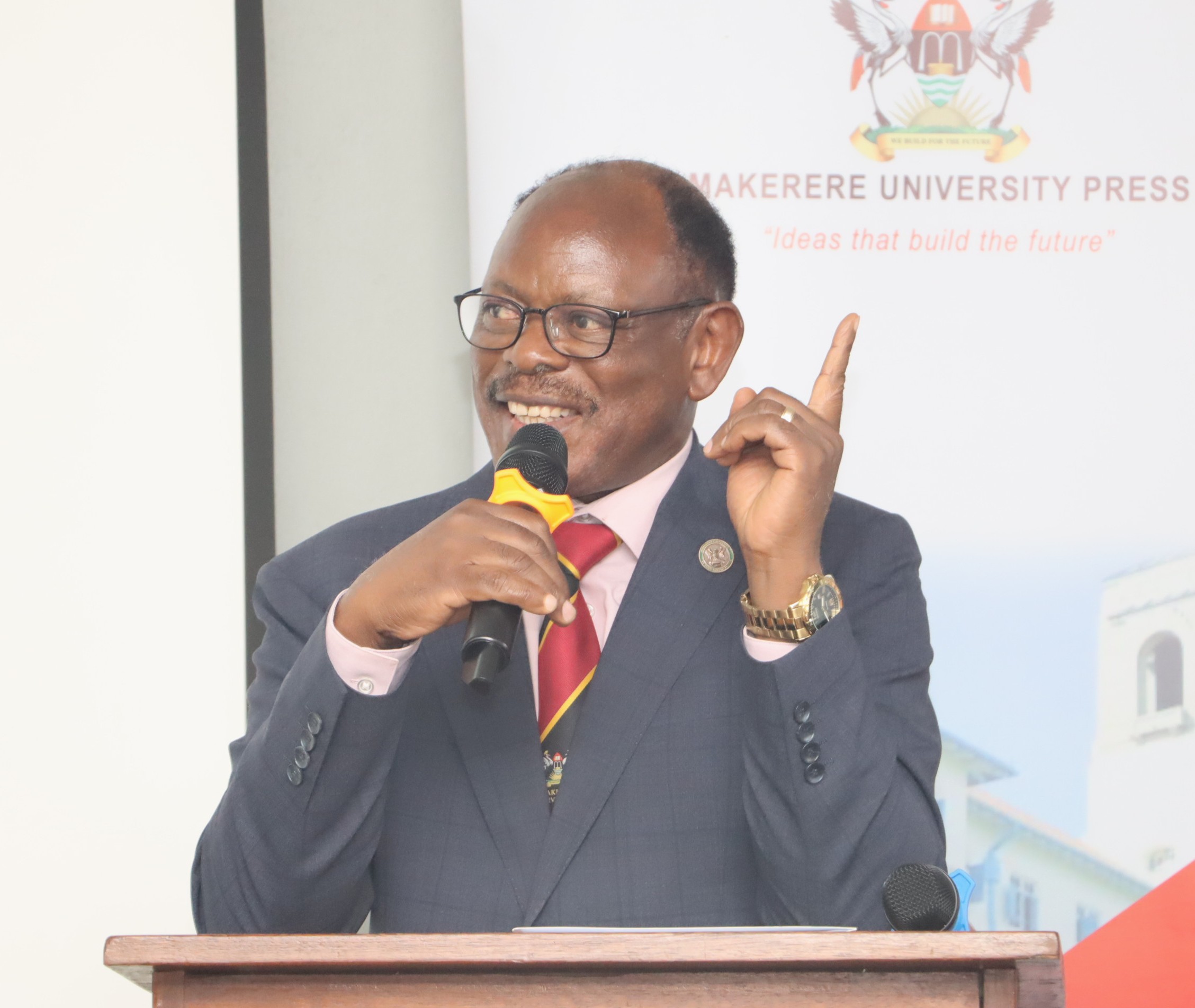
He cited China as an example, noting how the country’s investment in research and education has translated into economic and global influence. “When we say China is the factor of the world, it is not that people just wake up and begin making things. They invest in education, in publication, in research. If we want to transform Africa, we must do the same.”
Prof. Nawangwe highlighted Makerere’s progress, revealing that annual peer-reviewed publications have grown from about 500 a decade ago, to 700, and now exceed 2,000. He acknowledged that the university still trails South African institutions, partly because they operate numerous local journals that absorb significant volumes of research. “We are not fully utilising the brand of Makerere University Press,” he said, pledging support to strengthen the press and scale up journal production.
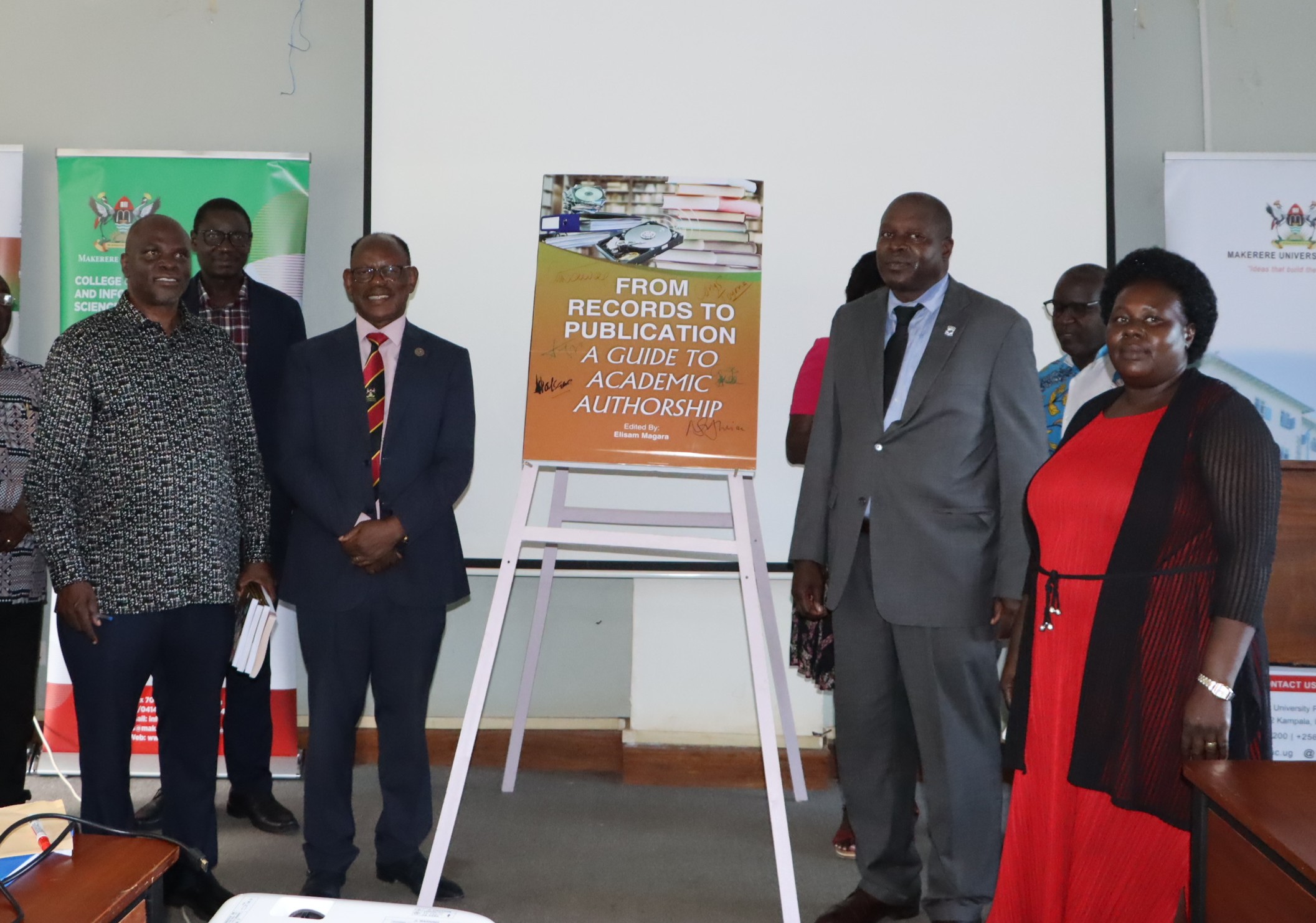
He also reaffirmed the university’s strategy to reduce excessive undergraduate enrolment and expand graduate training to boost research output. “Let us create time for professors to do research and supervise more graduate students,” he said.
Commending Professor Magara and his team for producing the authorship guide, Prof. Nawangwe described the book as an essential handbook for Master’s and PhD students, early-career researchers, and universities across the region striving to become research-led. “This is at the heart of the university. If we invest in research and publication, we secure our future,” he said.
Book Recommended as Mandatory Guide by College Principal
Makerere University’s Principal of the College of Computing and Information Sciences, Prof. Tonny Oyana, called for the newly launched volume to be adopted as a mandatory guide for graduate students and newly appointed lecturers. “This is not a bad book for our first-year PhD students to start with,” he said. “Even those who are hired as junior lecturers still need mentorship. If I were the Vice Chancellor, I would put this book as required reading for every new hire.”
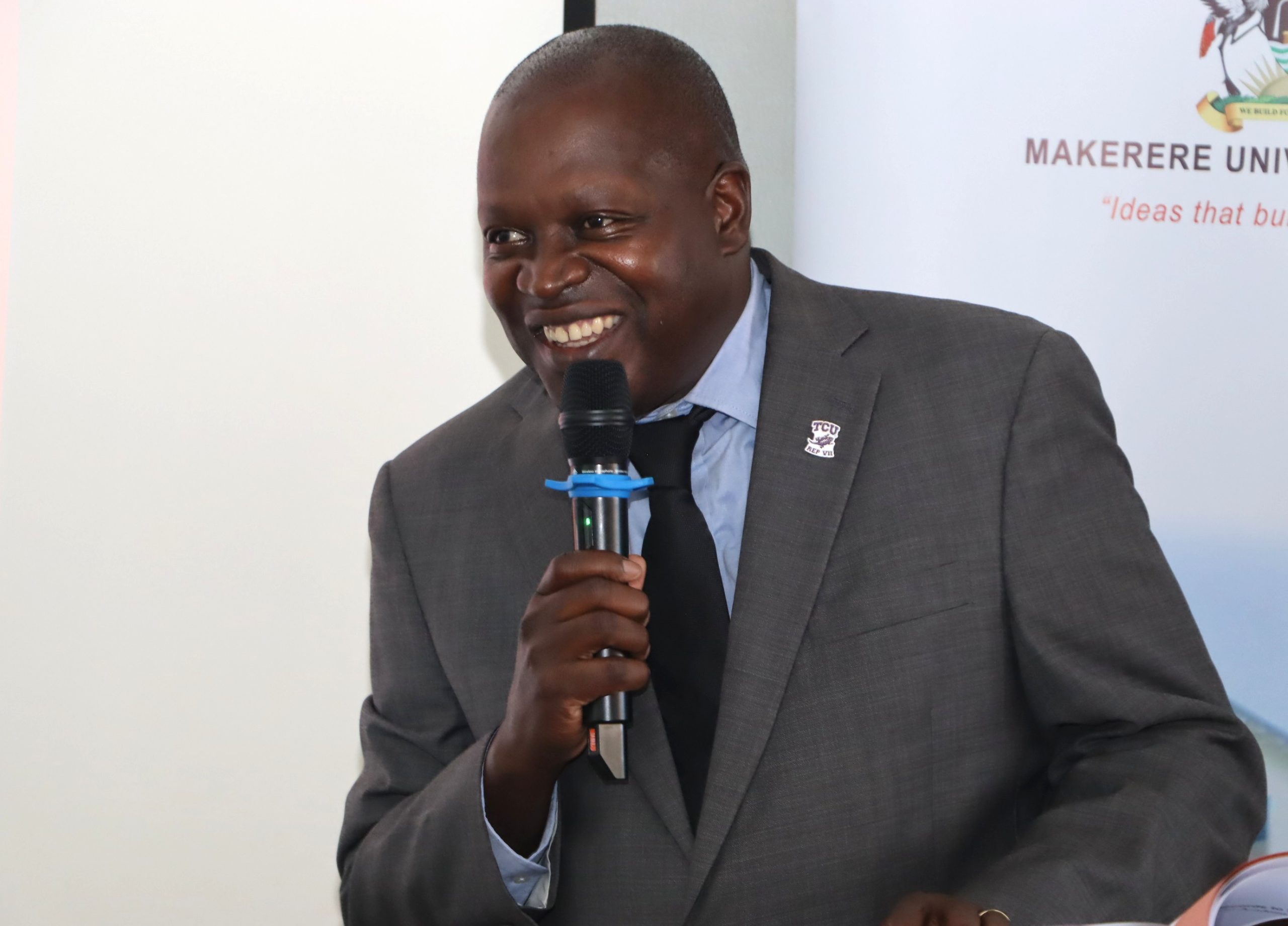
Prof. Oyana reflected on his personal contribution to the book, revealing that administrative responsibilities nearly forced him to withdraw. “Because of the work that I do, I was about to give up,” he admitted. “But Professor Magara was persistent. He came back to me and gave me more time.”
He credited a PhD student, Caroline Ilako, for assisting with library research and literature reviews, saying, “She did a wonderful job. We went back and forth through revisions, but finally we produced the work.”
On the quality of the book, Prof. Oyana said, “When you pick up a book, look at how it is laid out. The quick judgment tells you about the quality. This is well put together. We are beginning to show quality comparable to Western presses.”
He also challenged traditional notions of “publish or perish,” noting, “As scholarship evolves, those who evaluate scholarship must also adjust. Impact, innovation, and tangible products are increasingly valued alongside journal articles.”
Editor Highlights Research-Based Approach
Prof. Elisam Magara, the book’s editor, explained that the guide is designed to support scholars from the moment they conceive a research idea to the point their work is published and read. “I looked at the books we were using and asked myself: which kind of book can truly guide students? We needed a clear guide from the time a scholar thinks of writing up to the time the book is read,” he said.
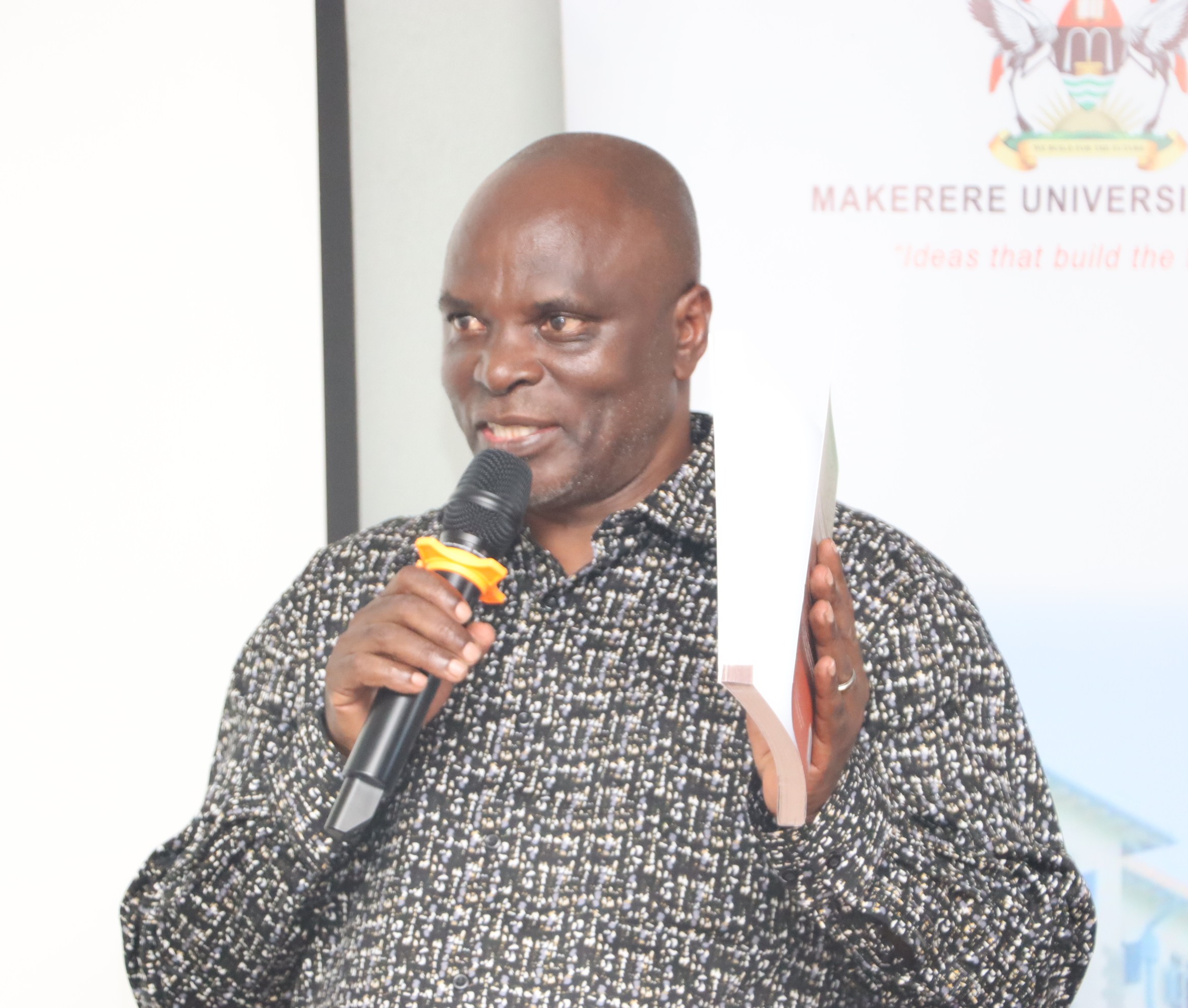
He detailed the rigorous editorial process that began in 2022, including international calls for contributions, peer review of abstracts, writeshops for feedback, and multiple rounds of chapter reviews. “Don’t write and keep,” he advised. “Your book must have impact. It must reach the public and be used.”
Prof. Magara also acknowledged the sabbatical granted by the Vice-Chancellor, which enabled him to balance teaching and editorial responsibilities. “This book is meant not just for Makerere but for scholars across the region and beyond,” he said.
Mak Press Outlines Rigorous Publishing Process
Dr. Isaac Tibasima, representing the Managing Director of Makerere University Press, explained the publication pathway. “Once you bring your manuscript to the press, we take it through evaluation, external peer review, revisions, copy-editing, typesetting, and pre-press review before printing,” he said.
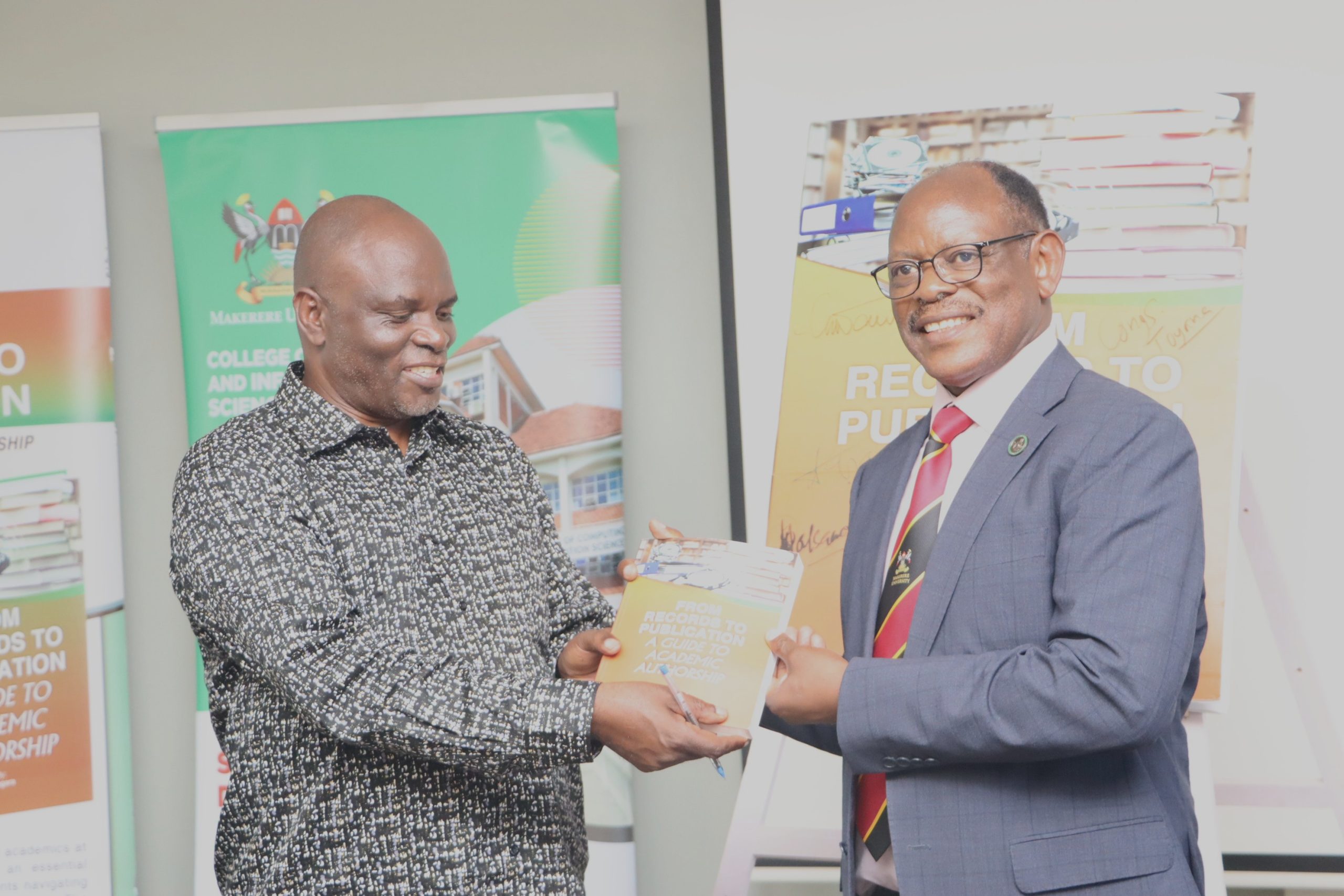
He also highlighted the press’s efforts to strengthen college-based journals. “We will not run the journals, but they will be published under the imprint of Makerere University. If we produce consistent issues, we can then move toward global indexing,” Dr. Tibasima said.
All new journals and articles now carry Digital Object Identifiers (DOIs) to enhance discoverability, while past publications are being retroactively assigned DOIs. “We are not there yet, but we are moving there, and we are intentional about getting there,” he added.
School Leaders Celebrate Scholarship and Mentorship
In welcome remarks, Dr. Sarah Kaddu, Dean of the School, said, “This event is a celebration of scholarship, intellectual discipline, and the journey of knowledge creation. This book speaks directly to one of the most critical challenges facing scholars—transforming research records into publishable work.”
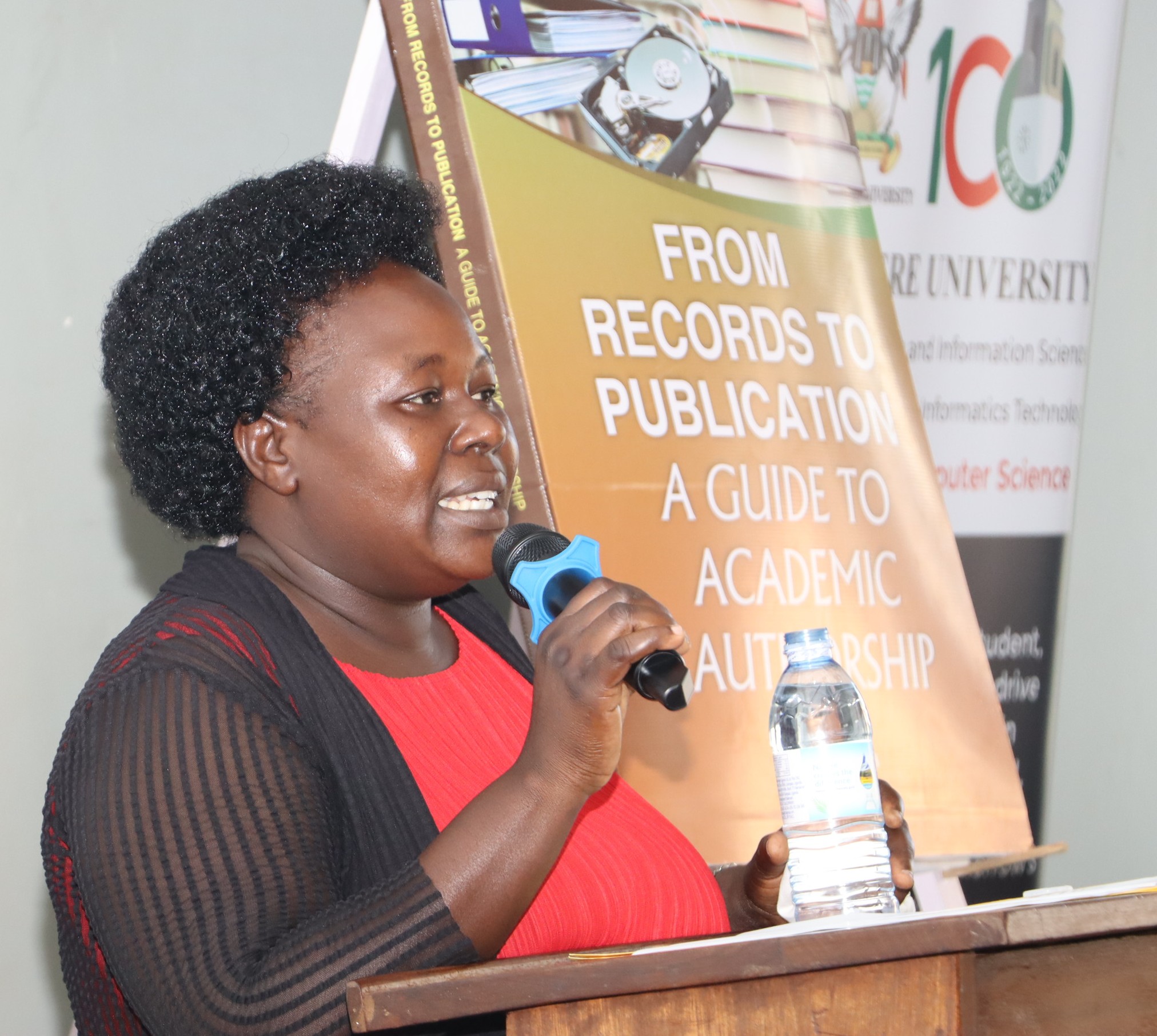
Dr. Sylvia Namujuzi, Head of the Department of Records and Archives Management, added, “This book is timely. It responds to real challenges faced by early-career researchers, postgraduate students, and even seasoned academics—questions of structure, authorship ethics, citation, collaboration, and navigating the publication ecosystem.”
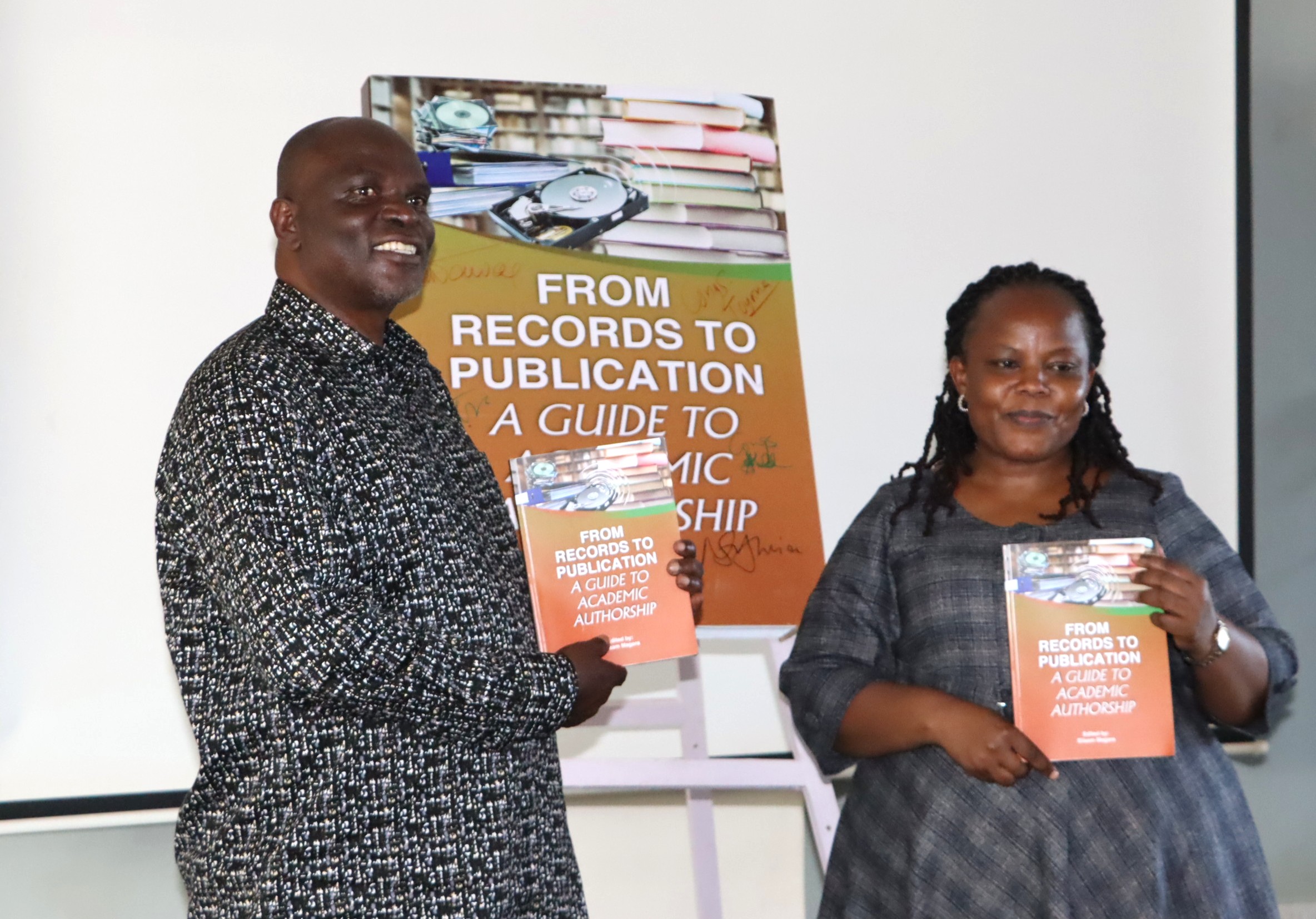
She concluded: “Well-managed records are not endpoints; they are the beginning of inquiry, reflection, and publication. This guide demonstrates that pathway.”
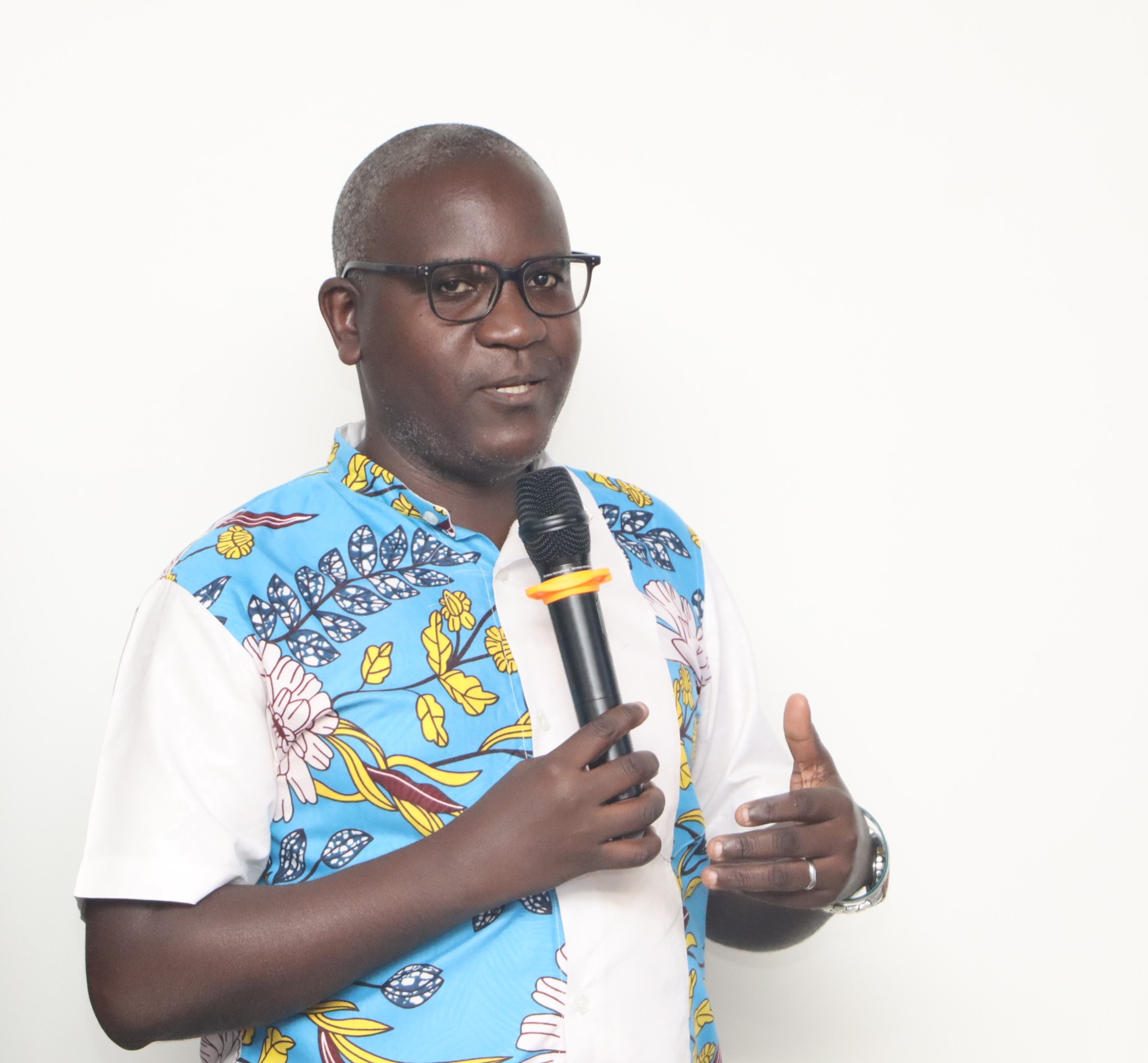
Book Outline
- Introduction: Publication Journey. (Prof. Elisam Magara)
PART I: Foundations of Academic Authorship.
- Conceptual Foundations of Academic Authorship
Elisam Magara and Joseph Kiplangat.
- Archives as a Source of Information for Academic Writing
David Luyombya, Sylivia Namujuzi and Francis Ekwaro
- The place of Oral History in Contemporary Writing
Elisam Magara, James Nkanshah-Obrempong and Nthan Nzyoka Joshua
- Managing Ethical Dilemmas in Academic Writing
Maria Tsvere, Tsitsi Kanonge and Joselin Chigwada
- The Role of Copyright and Neighbouring Rights in Protecting Works of Authors and Publishers in Uganda
Ronald Kakungulu Mayambala
PART II: Managing the Publication Process
- A Manuscript: From Inception to Publication
Sarah Mirembe Kyankya
- Managing Co-Authorship in Academic Writing
Gankhanani Moffat Moyo
- Managing Illustrations and Visual Artworks in Academic Writing
Bob Magara Rutatugirwa
- Tapping into Open Access Platforms for Gainful Authorship
George Muganga
- Managing the Costs in Academic Authorship
Aloysius Rukundo
- The Important Translation in Publication
Monica Mweseli
- Citations and Referencing in Academic Writing
Clement Lutaaya Nabutto, Namujuzi Sylivia, and Daviv Luyombya, Makerere University
- Referencing Management Software In Academic Writing
Odeke Moses Osamai and Constant Okello-Obura
- Compliance with International Bibliographic Control Standards in Academic Authorship
Elisam Magara and Dniel Osinde
PART III: Secondary Services in Academic Writing
- Journal Impact Factor and its Role when Submitting a Publication Article
Tonny J. Oyana and Caroline Ilako
- Managing Mentorship Programmes for Scholarly Writing
Diyoshak Rhoda Danladi and Elisam Magara
Report by
Jane Anyango, Principal Communication Officer CoCIS
Ritah Atukwatse, Journalism and Communication Student (2nd Year)
Fred Kanwagi, Journalism and Communication Student (3rd Year)
Computing & IS
CoCIS CIPSD Short Courses Jan-Mar 2026
Published
1 month agoon
January 19, 2026By
Mak Editor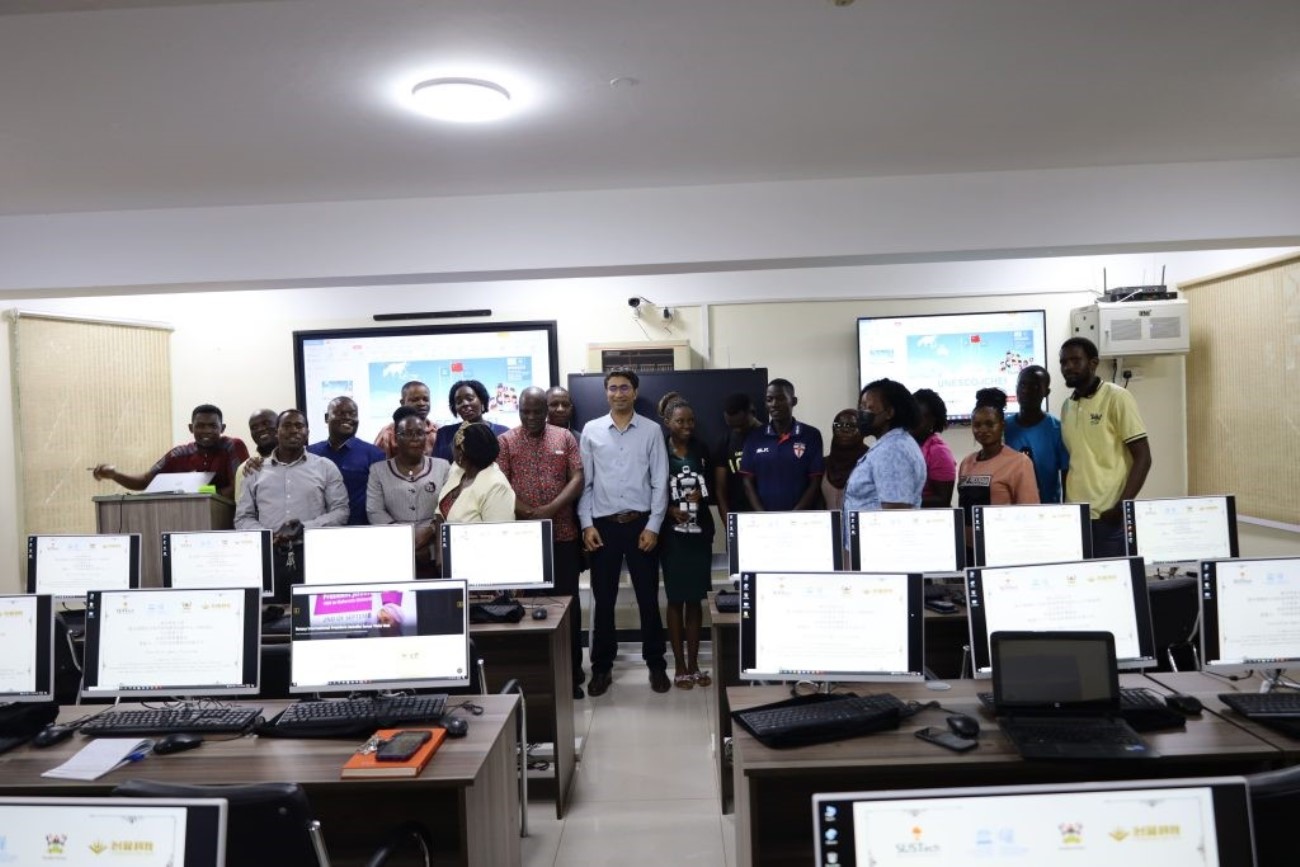
Makerere University College of Computing and Information Sciences (CoCIS) is the main ICT Training, Research and Consultancy Centre in Makerere University. The College has six Academic departments comprising of the Department of Computer Science, Department of Networks, Department of Information Technology, Department of Information Systems, Department of Library and Information Sciences, and the Department of Records and Archives management.
In addition to the mainstream degree programmes, CoCIS has a specialized Center for Innovations and Professional Skills Development (CIPSD) which delivers state-of-art training in ICT e.g. the Cisco Networking Academy for Cisco related courses, the Microsoft IT Academy Program for Microsoft related courses, International Computer Driving License course, Oracle Certified Training center for Oracle, Linux and Unix Training center. CIPSD also offers Machine Learning, Big Data Analytics, Data Science, Artificial Intelligence (AI) and Ethical Hacking as online courses. The College is an authorized Testing center, operating under PearsonVUE and Kryterion. Listed in the table (see download below) are the courses currently offered at the Center with their next start dates, duration, and cost.
- All courses are at affordable fees catering for Students, Vacists, Professionals and
- Anyone who wants to start a career in ICT or polish his/her ICT skills.
Contact Information
E-mail: psd.cis@mak.ac.ug
Tel: +256 782 512 897 +256 752 779964
URL: https://cocis.mak.ac.ug/cipsd/
Computing & IS
Makerere University and SoonPay Sign Landmark MoU to Champion Blockchain Innovation and Financial Inclusion Across Africa
Published
3 months agoon
December 9, 2025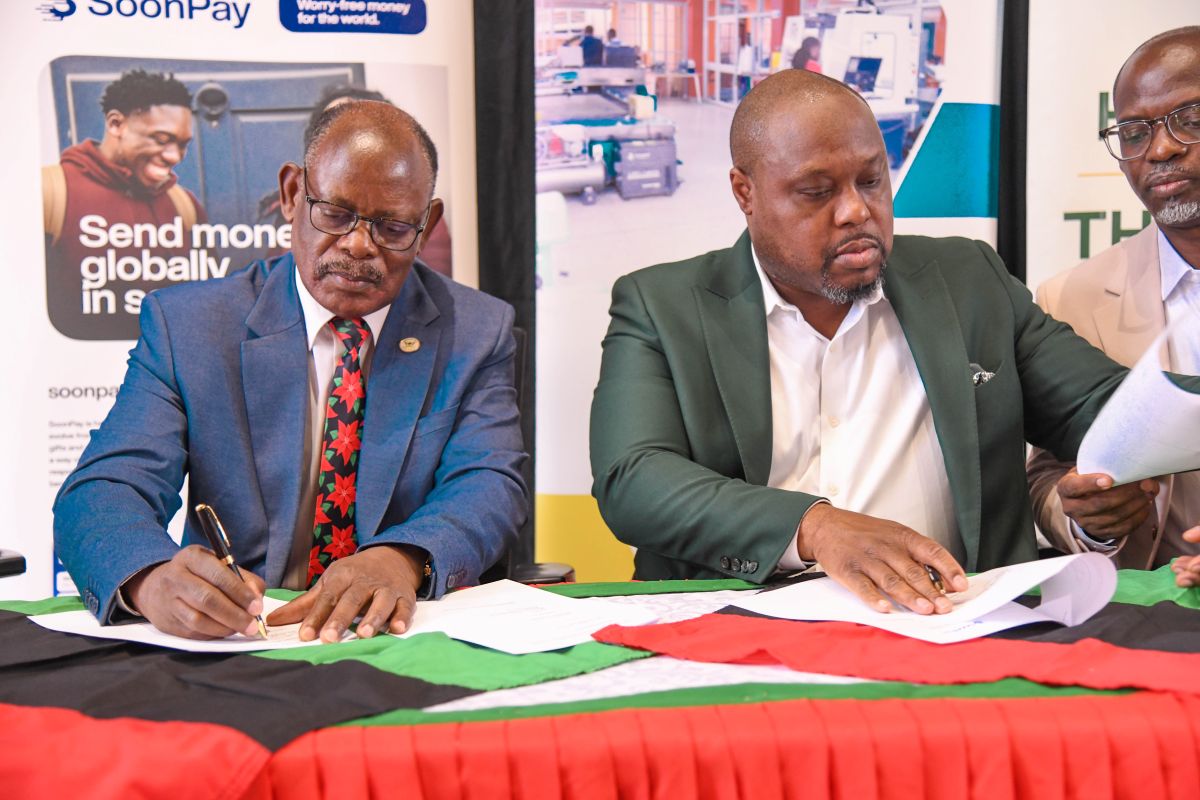
On Saturday 6th December 2025, Makerere University entered into a ground-breaking partnership with the U.S.-based fintech company SoonPay, marking a major breakthrough in Uganda’s push to integrate emerging technologies into research, innovations, higher education and national development.
The Memorandum of Understanding was signed by the Vice Chancellor of Makerere University, Prof. Barnabas Nawangwe and Mr. Frantz Morency, Chief Executive Officer of SoonPay L.L.C, during the Makerere University Financial Innovation Day, a high-energy event that brought together over 800 students, faculty, industry partners, and technology leaders.
The MoU institutionalizes the collaboration of Makerere University through the Makerere University Technology and Innovation Centre and SoonPay LLC. The signing ceremony was witnessed by Dr. Cathy Ikiror Mbidde-Manager of Makerere University Technology and Innovation Centre and Ms. Vuyani Jones-Blockchain Infrastructure Manager.
Organized by the Makerere University Technology and Innovation Centre (MUTIC) in partnership with SoonPay, the event ran under the theme “Innovation and Financial Inclusion for a Secure Future.” It featured keynote speeches, panel discussions, live demonstrations, and the signing of a Memorandum of Understanding (MoU) that will usher in a new era of blockchain training, research, and innovation at Uganda’s premier university.
The event was supported by several partners, including the National Social Security Fund (NSSF), the Uganda Blockchain Association, the National Planning Authority (NPA), Prudential Uganda, and other technology and financial sector stakeholders.
A Strategic Partnership to Transform Africa’s Digital Landscape
The newly signed MoU between Makerere University and SoonPay is expected to unlock a broad set of opportunities for students and academic staff. These include blockchain education and certification, joint research projects, internships and apprenticeships, the development of new financial inclusion tools, and the integration of emerging technologies into existing academic programs.
SoonPay’s entry into Uganda is part of a larger vision to expand blockchain-driven solutions across Africa—a continent its executives say has historically been excluded from global technological revolutions.

Impressed by the overwhelming numbers of students who filled the Yusuf Lule Central Teaching Facility Auditorium to the brim, the Vice Chancellor, said: “Dear students, by choosing to stay on campus, on a Saturday, and after completing your examinations, you have demonstrated your willingness to learn and embrace the blockchain technology as well as emerging technologies in general.”
Stating that blockchain technology is the future for Africa, the Vice Chancellor challenged the students to take charge of Africa’s digital transformation.
“You are the people to emancipate Africa from marginalization,” he declared. “What will liberate our continent is not politics—we have done too much of that. It is education, research, innovation, and technology.”
Prof. Nawangwe delivered a sweeping historical reflection, tracing Africa’s technological setbacks to the destruction of its civilization over several centuries.
“For 400 years, Africans were taken away as slaves. For another 200 years before that, our lands, knowledge systems, and technologies were disrupted,” he said. “This represents around 600 years of destruction and marginalization of African civilization.”
He urged students not to miss the opportunity that modern technologies such as blockchain and artificial intelligence present.
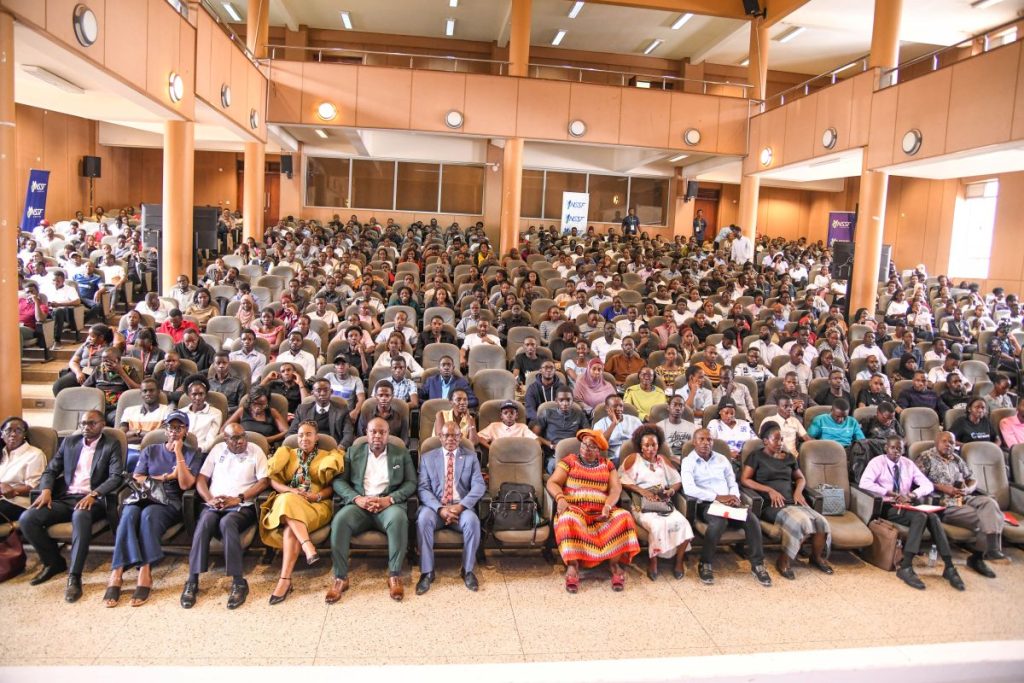
“We are lucky to be living in an era where Africa is free,” the Vice Chancellor said. “My hope is that we do not wait another 600 years to take advantage of this freedom. The most important resource we have is not minerals; it is human resources—you, the youth.”
Prof. Nawangwe reminded students that Makerere’s reputation as the “intellectual capital of Africa” places immense responsibility on their shoulders.
“You are among the very few Ugandans privileged to study at Makerere University. University graduates are not supposed to wait for jobs—you are the ones expected to create them,” he said.
Why Blockchain? Transparency, efficiency, and global competitiveness
The Vice Chancellor highlighted the transformative potential of blockchain technology, especially in improving financial systems—a sector he described as the backbone of any modern economy.
“Without efficient financial systems, nothing else works,” he said. “Blockchain offers transparency, reduces fraud, and minimizes corruption. If applied properly, it could transform how we manage finances, education, and even our natural resources, including the oil that Uganda is about to exploit.”
He added that Makerere’s students are already demonstrating global competitiveness in innovation, winning international competitions and creating products across multiple disciplines.
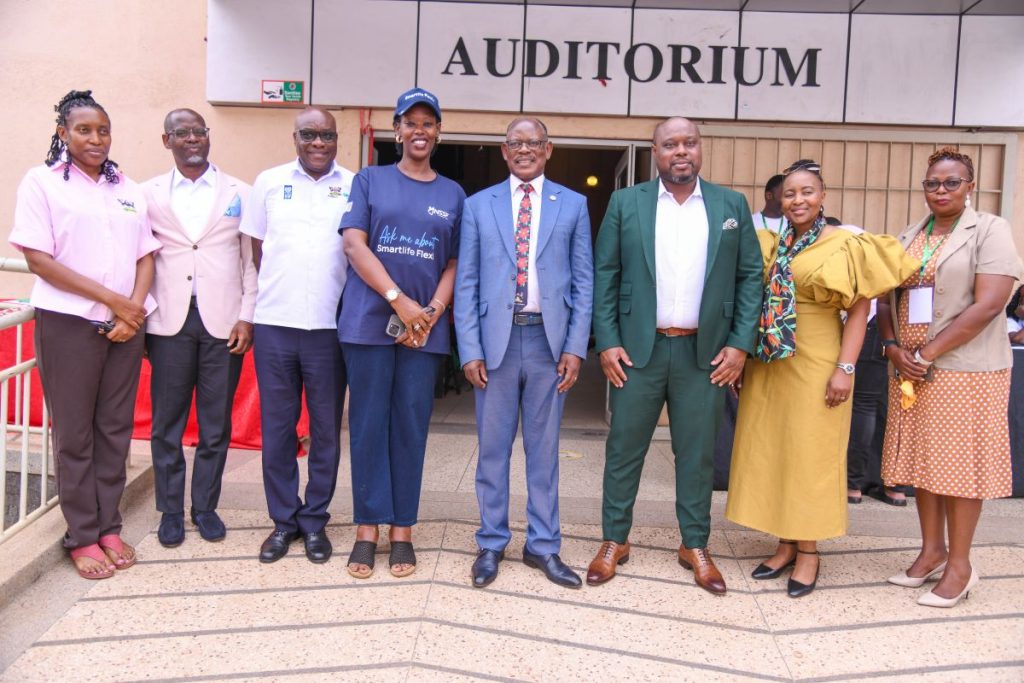
“The brains are here,” he said. “What we need is exposure to opportunities and technologies that will help you turn your ideas into impactful solutions.”
In a passionate keynote address, SoonPay CEO, Mr. Frantz Morency underscored why his company chose Uganda as its launchpad for blockchain adoption in Africa.
“As the Professor said, we have been excluded for more than 400 years,” he stated. “Even though we’re an American company, we know our roots. Look around the SoonPay team—you will see yourselves. We chose Uganda intentionally.”
Mr. Morency pointed to Africa’s dismal participation in the global blockchain economy. “In the U.S., blockchain generates $2.6 billion—61.7 percent of the world’s share. The rest of the world generates $1.6 billion. And Africa, just $14 million, or 0.33 percent,” he said. “That is unacceptable.”
He attributed the gap not to a lack of interest among young Africans, but to a lack of opportunity. “You want to learn—what you lacked was opportunity,” he said. “With the support of Professor Nawangwe, Dr. Cathy Ikiror Mbidde, and Dr. Margaret Nagwovuma, SoonPay wants to bridge that gap in education, technology, and economic opportunity.”
Mr. Morency also shared his personal journey, connecting his Haitian background to the aspirations of African youth.
“Many of you may see me as ‘the guy in the green suit,’ but I come from a small island—Haiti,” he said. “My mother never finished first grade; my father never finished second grade. What they gave me was integrity, work ethic, and the determination to seize opportunities when they came.”
He urged students not to seek opportunities abroad out of desperation, but to build meaningful careers in Africa. “Africa does not need to lose its talent. Why can’t you build here? Why can’t businesses, innovation, and prosperity thrive here?” he said. “Educate yourselves. Build. Create. Grow.”
A milestone for Makerere and Africa
Dr. Cathy Ikiror Mbidde, Head of the Makerere University Technology and Innovation Centre (MUTIC), described the event as a “major milestone” in the institution’s evolution.
“We are here to witness one of the key emerging technologies and to reflect on how universities can embrace such milestones,” she said. “Everyone has a role to play in transforming our lives through research, ideas, and projects.”
She thanked SoonPay for choosing Makerere University, noting that students had been “instrumental” in pushing for blockchain education.
“You have been constantly asking questions, pushing us, and showing deep curiosity about blockchain. Today, we finally have answers,” she told the students.
Beyond the speeches, the event showcased SoonPay’s blockchain infrastructure, student-led innovations, and a roadmap for integrating digital finance tools into university programs. Partners such as NSSF emphasized the importance of preparing young people for a digital future.
With the MoU now in force, Makerere University is positioning itself as a regional hub for blockchain education, research, and innovation. The partnership with SoonPay aims not only to train students but to shape Uganda’s—and Africa’s—next generation of tech leaders.
Trending
-

 Humanities & Social Sciences4 days ago
Humanities & Social Sciences4 days agoMeet Najjuka Whitney, The Girl Who Missed Law and Found Her Voice
-

 Health1 week ago
Health1 week agoUganda has until 2030 to end Open Defecation as Ntaro’s PhD Examines Kabale’s Progress
-

 Agriculture & Environment7 days ago
Agriculture & Environment7 days agoUganda Martyrs Namugongo Students Turn Organic Waste into Soap in an Innovative School Project on Sustainable Waste Management
-

 General1 week ago
General1 week agoMastercard Foundation Scholars embrace and honour their rich cultural diversity
-

 General3 days ago
General3 days ago76th Graduation Highlights
